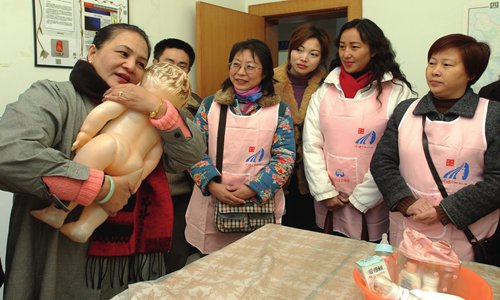
Employers and foreign domestic workers hope China can ease policies so that foreign domestic workers can legally work in the country. Photo: VCG

Filipino maids are in high demand in China due to their ability to speak fluent English and their professionalism. Photo: VCG
Rachel (pseudonym), a 42-year-old Australian mother, is glad to hear the recent news that Beijing authorities are considering changing the rules on foreign domestic workers following the launch of the policy in Shanghai's Pudong district.
Rachel has been in China for almost 10 years and now lives in Shanghai's Jing'an district.
"Our former Filipino ayi Sara is very good, and my children love her. She was with us for six years, and two years ago, she had to leave China because her mother died back in the Philippines. We miss her so much!" said Rachel.
According to Chinese law, foreigners are not allowed to take low-end jobs providing domestic household services for either foreign or Chinese employers.
Yet, to attract more high-end foreign talent, Shanghai allowed high-end foreign talent to hire foreign domestic workers, mostly from the Philippines, with a private matter visa (S2-visa) for entering China in Pudong district in 2017.
According to a notice on Beijing municipal government's website in January, Beijing Municipal Commission of Commerce said they are weighing a proposal to offer work and residence permits to foreign maids of high-end foreign talent as well as high-end talent from Hong Kong and Macao.
A skilled workforce
Rachel recalled that eight years ago when she was looking for an ayi, Sara was recommended to her by a friend. Before having Sara, Rachel also met several Chinese ayi but was not satisfied with them due to the language barrier.
"Sara can speak fluent English. She is professional and always caring for the children. With her taking care of the children, it feels much easier for me," said Rachel.
When Sara left two years ago, Rachel hired a Chinese ayi who helped her do some household chores, but she still hopes that one day Sara will come back.
From Rachel's perspective, her Filipino ayi was able to do her job without direction and the fact that she could speak English made day-to-day dealings easier, something she said she did not experience with her Chinese ayi.
Foreigners are not the only ones in need. Chinese people also have an increasing need for foreign maids partly due to Chinese parents' focus on their children learning English and the baby boom under China's two-child policy.
Nora (pseudonym), a 26-year-old Filipino nanny working for a Chinese family in Beijing, came to China in 2014.
Nora told Metropolitan that she came here to work as a nanny because the agent offered her a high salary. She has worked for two Chinese families. Her monthly salary during the first year was 5,500 yuan ($868), and now it is 7,000 yuan.
She says she misses her family from time to time and visits them twice a year. The most memorable experience was when she and the Chinese family traveled to Hainan Province. "For me, Hainan is just like the Philippines," said Nora.
"I did not have any work experience as a nanny, but I am trying my best to be a good nanny to my little 'bosses.' I like it when the kids learn from me, especially speaking English." Metropolitan reached out to an agency as a customer.
The service staff on an online platform that connects Filipino maid agencies in China sent over several short interview videos of Filipino maids over WeChat.
She alleged that in recent years, they have seen an increase in the need f0r Filipino maids in China for customers including Chinese and foreigners. So far, over 4,000 families have found Filipino maids through the service.
"These Filipino maids, ranging from 20 to 50 years old, can speak fluent English, are well trained and have years of work experience in other countries and regions including Singapore, Dubai, Hong Kong and Taiwan," she said.
When it comes to education, some of them have a university diploma. Besides fluent English, some also have Chinese language ability. In addition, aside from Western food and food from their home countries, the maids can also make Chinese and halal food, she said.

An experienced Filipino domestic service trainer provides childcare training at an ayi school in China. Photo: VCG
Bypassing the law
Although foreign maids have a market, most of them work here illegally.
Many agencies try to exploit the lucrative market, which makes it more chaotic.
To bypass the law, foreign maids usually come to China on a tourist visa. They will apply for an extension or try to get a business visa when it expires. There are some who still work without a valid visa or overstay their visas.
Rachel said she knew that many of the families in Shanghai have hired Filipino maids, but they avoided talking about it because they know their maid is working illegally.
"Many people are charged high fees by the agents to get and keep a Filipino ayi. They'd like to protect them from being caught by the police or driven out of China," said Rachel.
Rachel also paid the agent over 20,000 yuan for introducing her to an ayi and for handling the visa, resident documents and paperwork for her. In addition, she paid her 6,000 yuan a month as well as other fees such as airfare.
For some agents, the agent fee includes introducing the Filipino ayi and dealing with their visa issues, while for other agents, it only covers introducing the ayi. For the visa issue, there will be an additional charge such as in Nora's case.
Nora recalled that her first Chinese employer paid 20,000 yuan in agency fees for introducing her and there was also a deduction from her first year's salary of 5,500 yuan. She is now on a work visa, and it is dealt with by her Chinese employer.
"My employer is the one who processes my visa. If the agency is the one to process it, my employer will have to pay them again," she said.
According to a report from the Beijing News in 2017, two Chinese agents went on trial in Beijing. From 2014 to 2015, they cheated on Chinese visas with fake invitation letters and helped Indonesian and Filipino women illegally enter China to provide domestic services for Chinese customers.
The two agents said in the court that there is a great need for Filipino maids in Beijing's market. They charge a fee of 20,000 to 50,000 yuan for successfully introducing one, and they also deduct money from the ayi's monthly salary.
Policy change
Over the past two years, China has loosened control on foreign maids with steps to open up jobs to them for high-end talent living in China.
In March 2017, the CEO of a company in Shanghai surnamed Liu applied for a one-year residence permit for a foreign domestic worker named Mary and it was approved. Liu has a five-year talent visa (R visa), which qualified him to hire Mary, Xinhua reported.
However, Zhou Juemin, the associate head of Shanghai Home Service Industry Association, said "the timing for opening the market for Filipino maids in Shanghai was not ripe yet," according to a 2017 report of thepaper.cn, a news portal in China.
Zhou said on one hand, both Filipino maids and employers in Shanghai might not adapt to each other. One the other hand, though the first generation of Filipino maids who came to Hong Kong in the 1970s was highly skilled, the quality of current Filipino maids is not consistent. Many Filipino maids come from the countryside of the Philippines with a low level of education, and the quality of their service is not as good as their predecessors.
The January notice about Beijing said they are considering that high-end foreign talent, high-level creative and innovative talent and high-level talent from Hong Kong and Macao with a Chinese green card or work-type residence permit can apply for a residence permit for their foreign maids.
"As of now, our government hasn't confirmed that there is a concrete and legal document signed by both countries to legalize Filipino maids in China. The one in Shanghai might just be a pilot project. But the issue is definitely on the table," a staff member working in the Embassy of the Philippines who prefers to remain anonymous told Metropolitan.
In January, the Department of Commerce of Zhejiang Province also held a meeting to discuss allowing foreign domestic workers to increase the supply of high-level domestic workers in Zhejiang.
In recent years, many organizations in China have invited Filipino maids on training events for their Chinese workers.
"If the government approves the said proposal, it will be a great opportunity for us Filipinos to work here," said Nora.
